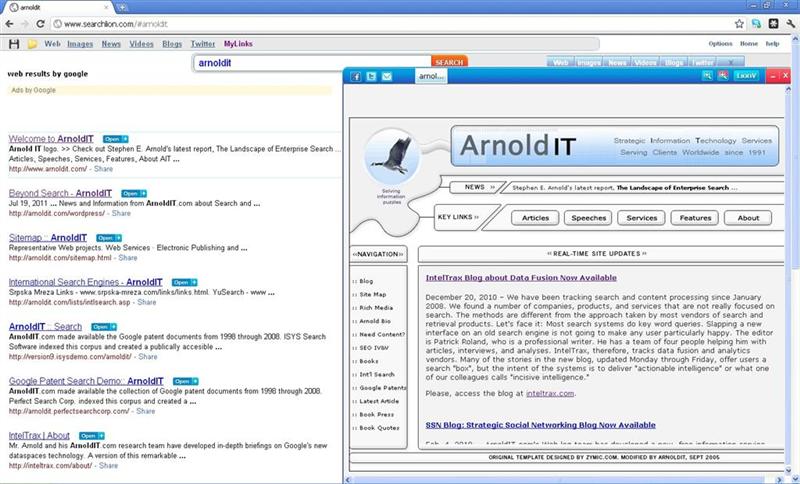SearchLion
An Interview with Feivi Arnstein
|
|
The Web search and retrieval sector is maturing. On August 1, 2011, I had an opportunity to learn about SearchLion, a next generation metasearch system developed by Feivi Arnstein, a youthful entrepreneur from Israel. Background Mr. Arnstein was born in Canada, has lived in Europe, the Middle East and the United States. He speaks five languages. After completing advanced Talmudic studies at the Israel Torah Research Institute, he worked in the financial services sector. (He originally planned on being a rabbi.) |
SearchLion reflects a different approach from the keyword method that is quite different from the brute force approach used by the early Web search systems. In fact, the tagline for the service is “The New Way to Search.” To make certain a user understands the new direction the company is taking, the splash page offers the greeting, “Welcome to 21st century Web search.” We talked over iced tea and explored the market and the SearchLion service.
The full text of my conversation with him appears below:
The Interview
What's your background?
My first professional background was as a Technical Futures trader. I spent several years making a living day trading equity futures from my own private office. When you trade equities, you use software which makes use of every inch of screen space. So, for example, you can have a screen which is evenly split into four equity charts.
Isn’t that confusing to a user?
No. The concept is simple: the more data you can access on the screen, the more productive you will be. I was accustomed to the efficiency of trading software. I realized that when searching and browsing the web, there were big parts of the screen going to waste. So I sought to find ways to use the available screen space to give the user more data.
So the idea for SearchLion is based in making maximum use of the display space and reducing the amount of time a professional needs to pinpoint a key item of information. Am I close to you approach?
Yes. Saving time means more efficiency. Quicker access to information delivers many benefits to today’s professionals.
Exalead was purchased by Dassault and InQuira by Oracle. Is SearchLion an acquisition possibility?
Yes. I was interested in learning that Exalead was being bought by a non-search related company. This shows that general search technology--as opposed to only Web search--is being seen as an attractive, viable industry.
For SearchLion, we have technology and the opportunity for breakthrough in interface. We think we are well positioned to contribute to some of the new approaches such as augmented reality.
What are the types of problems that SearchLion is addressing?
The search process can often be a slow one. When someone does a search and isn't sure which of the search results is the one he needs, he has to start opening search results one after the other, until he finds what he or she is looking for. SearchLion's main feature, SearchBrowse, speeds this process up tremendously.
Can you show me? Run a query for “ArnoldIT”, please.
Sure, let me run a query. As you can see we get a result list. When I click next to the first hit, an in browser window opens. It is not necessary to navigate away from the search result page. Also, you don’t end up with window clutter, which is an issue with some modern browsers.

What are the differences between SearchLion and other metasearch systems like Ixquick or IceRocket?
The main difference is the front-end features we offer. Most search engines today offer more or less the same as ten years ago: a list of links. SearchLion's focus on UI innovation is a paradigm shift in the industry.
What are the three key technical attributes of SearchLion?
As you saw, we can display of a live Web page within the user's browser when accessing SearchLion. Our approach all ties in to our concept, mentioned above, that the more data you have on the screen at the same time, the more productive you'll be.
Why not open a search result in a different window or tab?
We think this fosters switching back and forth which is time consuming and can be confusing to many users. If you can have results and the source both on the same screen, our research suggests that users can find what they looking for much more quickly.
In addition to opening the live sites, you can also save your searches together with the live sites. When you then load a search from your saved list, the live sites open automatically. We’ve used the same concepts without our MultiView features. Instead of the live Web site, MultiView uses the blank areas of the page to show you a different type of search result; for example, images, news, videos, etc.
What technical hurdles did you have to get over to deliver these features?
When showing more information, your browser will be using more resources. It took a lot of work and innovation to make sure the user gets his additional information, whether the live sites or the various types of results and still be extremely fast.
Would you describe a typical use case for your product?
Sure. The beauty of SearchLion is that its typical use case is a regular Web search. People who do a search are looking for something, and they want to find that something as fast as possible. So our ability to open search results on the page just helps speed that along tremendously. There are more specialized searches which benefit from our other features. The ability to view multiple websites next to each other, for example, is great for research of any kind.
Will you be offering a SearchLion app for mobile devices?
Definitely! We're already in the middle of developing a mobile-centric version which will be compatible with various different platforms and screen sizes. And an iPad-specific site should be available in the middle of August.
Can SearchLion be integrated with enterprise solutions from companies like IBM or SAP?
I don’t want to reveal too much about our product road map. I can say that we're definitely open to looking into this, provided there will be a demand for it from our users. There is room for improvement in the enterprise search market.
One of the problems I have encountered is working in one information space and needing current information from an enterprise system or another application. Will you offer that cross collection or cross application functionality?
Yes, we have long-term plans to integrate SearchLion with a wide range of additional applications and technologies, including VoIP and email. Due to its combination of searching and browsing, we believe that people will naturally spend more time on SearchLion than on other search engines.
How do you see SearchLion fitting into this hybrid search?
If a user gets an email or a VoIP call, we want to be able to let them know. It's important to us to make SearchLion as user-friendly as possible, and that includes giving the user as many productive options as possible.
In the shift to real time search, how do you deal with issues of latency for clients who assume that the info provided is fresh and timely?
In traditional search, the user always knew that the results he received could be days, weeks or years old. Current search engines have tended to confuse users by mixing their real-time and regular search results together. With our MultiView feature, we use the available space on the screen to enable the user to setup his regular results and real-time results on different sides of the screen, thus clarifying what he's looking at.
How do I activate MultiView?
There is at the top right of the screen a series of buttons next to the search box. Just click.
There is considerable interest in social search. Is SearchLion able to tap into the type of conversation streams that one associates with Facebook or Google+?
We have already implemented a unique Twitter search, which can be run side-by-side with regular search results. Like in our regular search, any url in a Tweet can be opened right on the page, which is very important in the social arena where everything is as real-time as possible. We have plans to add a similar search for Facebook soon. Although I believe that social search will never totally replace traditional web search, giving the user the option for both simultaneously is obviously the right thing to do.
When you look forward to 2012, what are some of the new features you and your team hope to introduce?
We have an extensive list of advanced features we're planning on implementing in areas like custom results display, social search and more. But we consider our best feature the fact that we listen. We actively solicit comments and suggestions. So new features will also involve the community, for example letting people vote on which features they want to see. We'll then focus on developing those first.
When you look out nine to 12 months, what are the major trends in your sector of the search market?
I think the public is ready to consider new search engines, as long as they have what to offer. Bing is a prime example of this. Bing had some cool features which Google didn't (for example instant video preview) and consequentially Bing has more market share than Microsoft's other search engines ever did.
We may see a shift towards new search offerings, as long as they can manage to get the exposure necessary to let the public know about them. Startups don't usually have the resources for PR and marketing that big players like Microsoft or Google have, so that will be the difficult part.
Yes, but the New York Times reported on July 25, 2011, that Bing is “too costly to keep.” (See The New York Times, national edition for July 25, 2011, “At Microsoft, Bing Too Costly to Keep”, page B 2.)
Search is expensive. Our approach is to use available indexes and then add value to their results. In addition, big companies like Microsoft tend to have overly bloated expenses. The advantage of being a start up is that we can keep things lean a lot more easily.
How can a person get more information about SearchLion?
The easiest and quickest way is to either email us at info @ srlion.com or to use the contact form at the site.
ArnoldIT Comment
SearchLion is an interesting solution to the confusion that some users experience when using a metasearch engine. The service’s tight integration with social media and its wealth of options warrant a close look. You can access the service at www.searchlion.com.
Stephen E. Arnold, August 3, 2011

